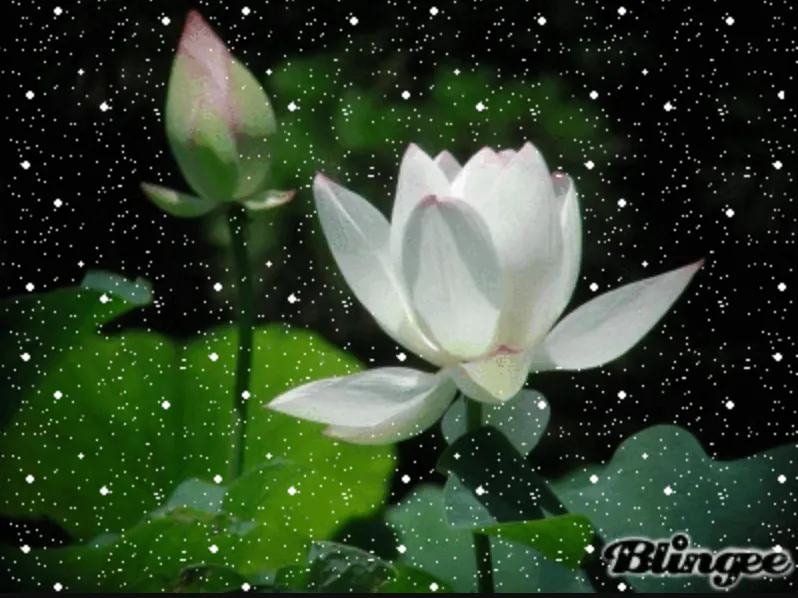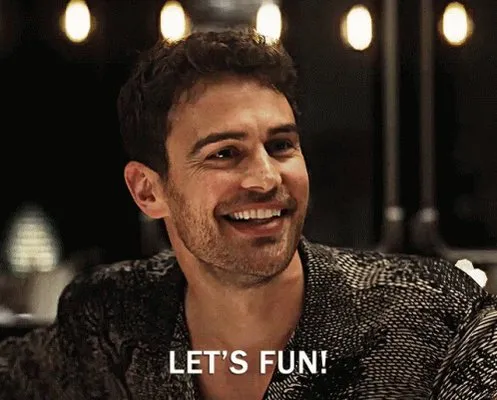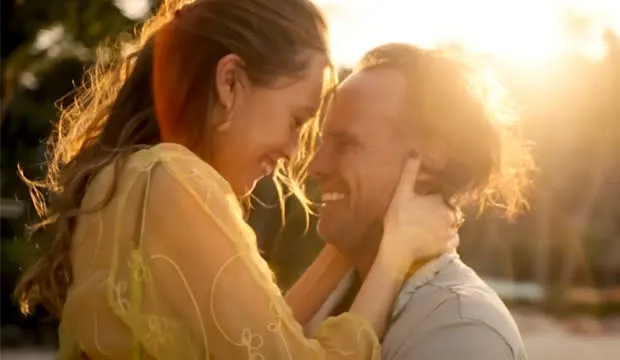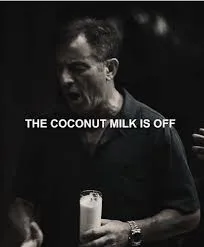Molly - White Lotus Checkout Time
THE WHITE LOTUS POSTMORTEM SPECIAL
For the three people reading this, stop, probably, if you're interested in watching it yourself. I've come to talk about The White Lotus and drink Coffee Mate® HBO® Original The White Lotus Thai Iced Coffee Creamer and Coffee Mate® HBO® Original The White Lotus Piña Colada Creamer and I'm all out of both flavors.

Well, I was kind of right and very wrong.
The more distance I have from the finale, the more I appreciate the season. Consensus seems to be that it is the least liked of the three. I think it was the least tidy (2, 1, 3) but I have always had a special fondness for works of art that tackle things their creators aren't sure they're up to tackling. Instead of a tighter focus on money or sex, Mike White took a big swing at spirituality, but also, everything. You could say season 3 is about how to live. It's about desire, the great equalizing curse of humanity. The White Lotus always examines how difficult it is to change and break cycles, but the stakes of that in Thailand were higher and sadder. Nobody got a big hopeful or triumphant ending a la Quinn Mossbacher or Mia and Lucia. Let's go!

Who to start with. Maybe I should go in ascending order of how much I care. OK.
The Girls
Like everyone else I think Carrie Coon is a powerhouse. Leslie Bibb and Michelle Monaghan - also great in these roles! Especially Bibb. But I never found myself that invested in the girls' trip. I absolutely believe that these sorts of subtly competitive and shifting female friendships exist, despite not being in any as an adult. One of my favorite writers, substack's Eurydice Lives, says pretty much all that needs to be said about why this arc didn't work and didn't earn its big cathartic monologue from Coon's Laurie.
As someone who has closed doors and isolated myself because I'm so allergic to other people having preconceived notions of who I used to be or should be, I did think Laurie's point was interesting and moving. "I don’t need religion or God to give my life meaning, because time gives it meaning. We started this life together... and I look at you guys and it feels meaningful.” There's something very brave about refusing to let lifelong relationships, even very fraught ones, slip away - to make peace with the idea that someone else is carrying the entire story of your life and all the versions of you that have existed.
Gaitok and Mook
The popular sentiment here seems to be that Gaitok and Mook were, together and as individual characters, boring and anti-climactic. Also that Gaitok is terrible at his job. I find a plausible reason for their boringness/underuse compelling on a metatextual level, though. While The White Lotus is like March Madness or the McRib or whatever for people who love middle aged character actors, Lisa from Blackpink is more famous by orders of magnitude than any Jennifer Coolidge or Michael Imperioli. I'm not a K-pop afficionado, but I know Blackpink's aura is very bombastic and "calling yourself a hot girl" empowering, especially compared to earlier eras of K-pop and especially especially compared to J-pop idols. Even so, I believe the strict boundaries around what stars are allowed to do still hold. That means that even in her capacity as an actress, Lisa and her team may have had serious limitations on what kind of character Mook could be and what kind of situations she could be in.
But that also means that Mook arrives on screen with all the connotations of being Lisa: gorgeous, talented, and out of reach. She is Gaitok's dream girl, but for most people she is also a girl so far in the stratosphere of beauty and fame that she may as well be imaginary. Her presence struck me a little as a contemporary, online version of Ziyi Zhang in 2046 where she shows up as a very eager love interest for Tony Leung and his emotional unavailability is extra harsh to us because we know she is one of the most beautiful women in the world. Just a little.
Like Rick (more below), Gaitok's mistake is being too devoted to the narrative he's decided he lives in. Unlike Rick, who I would argue could stand to lose a lot of "who he is," Gaitok's insistence on pursuing Mook chips away at his true character. Mook is his childhood friend, their families know each other, they get along, they work together, and he has an enormous crush on her. It's not crazy that he would think a romantic relationship is a natural, even inevitable path. With relatively little screentime, I do think White was clever in how Gaitok and Mook's soul-endangering incompatibility is rolled out slowly. I was unbalanced by their scenes together, skeptical over whether what seemed cute was cute or if something just felt off.
Belinda
A writer whose work I find myopic and intellectually lazy said of Belinda in a substack comment, "I loved her arc in the finale, but I hope we get to see her come into her power now..."
Which is a strange way to talk about Belinda's "arc in the finale," a culmination of pressures leading her to make a decision that will change her circumstances but also deeply compromise her moral understanding of herself. After recognizing "Gary" as Greg, who she last saw as the suitor that made heiress Tanya blow off her plan to help Belinda open her own spa, Belinda realizes she's onto something far more sinister. season 2 spoilers if for some reason you are in the middle of this and care about that Greg conspired to have Tanya killed so he could inherit her fortune. He failed, kind of, but Tanya did die her tragicomic death, so Greg is in luxurious hiding in Thailand now. Greg offers to give Belinda money, claiming it's something Tanya would have wanted. Belinda knows he is trying to buy her silence. Her son, Zion, is a sort of devil's advocate and encourages her not only to take the money, but negotiates the price all the way up to five million dollars.
Belinda is a character who values kindness and her own principles, even if they never get her closer to the kind of independent life she dreams of. But you get the sense that for her, her high moral and ethical standards let her feel set apart from the wealthy clients she's surrounded and disrespected by. She has a reasonable point of view! So does Zion, which is that the world doesn't work in a way that rewards things like his mother's conscientious and honest spirit, so why not at long last take the win where they can get it?
I don't agree with the takeaway that Belinda "did a Tanya" to Pornchai, the caring and hot Thai wellness mentor who floated the idea of them opening a spa together. Belinda didn't lead him on in the same way, and she also has valid motivations for getting away from Thailand and the man who just paid her off so he doesn't get indicted for conspiracy to commmit murder. When Belinda and Zion speed away from the island, Belinda seems lightly tortured as she waves to Pornchai. "Nothing from Nothing" kicks in, a nod not only to Rick's comment about himself but to the many transactional relationships that come and go on The White Lotus. I do not think Belinda has "come into her power," but she has come into a power, and is already realizing that you cannot obtain great wealth and expect to be, and be seen, as the same person you always were.
Rick and Chelsea
In Neon Genesis Evangelion's 24th episode, the protagonist, Shinji Ikari (not that anyone reading this doesn't already know), has just had the unspeakably traumatic experience of being forced to kill the first person to show him a glimpse of unconditional love. Lamenting that his victim, Kaworu Nagisa, should have been the one to live, Shinji's boss/mentor/surrogate parent Misato replies:
You're wrong. Only those with the will to live get to survive. He craved death. He abandoned his will to live and clung to a false hope.
You could say the same to someone arguing that Rick and particularly Chelsea should have survived the season. This is the arc I was most wrong about! I feel very stupid, because I fell for the old "Mike White does unexpected things and would never kill characters barrelling headfirst into deadly situations!" You can't subvert every expectation, because that then becomes another expectation.

I wanted against all odds for that running, hugging reunion to be the culmination of Rick's growth. (this being Mike White I do kind of think it was a little Bachelor franchise joke) I wanted to believe in Chelsea's stubborn optimism about her relationship, but that stubbornness was also - as said by White in the after credits talk - "romantic fatalism." She couldn't have been more explicit about being willing to join Rick in whatever his fate may be. Rick's story was ultimately about failing to break cycles even if breaking them would actually be the much (logistically anyway) easier path. His journey is a negative image of Gaitok's and there is a poetry in the latter being the one to kill the former. Gentleness and a true devotion to the spirituality of non-violence is what came easy to Gaitok. It was his insistence that Mook was the girl for him that required self-betrayal. Meanwhile a healthy, supportive partner was waving her arms in Rick's face, ready to accept him as he was at any moment, but his narrative of violence and revenge proved too compelling to walk away from.
The Ratliffs
Favorite Ratliffs in ascending order: Piper, Lochlan, Victoria, Tim, Saxon. Who would have known that Saxon would be at least tied for my favorite character to come out of this season - not me! When I wrote earlier that this season didn't have big winners in the Mia and Lucia sense - despite including a non-wealthy character getting a windfall - it's because I think that spirituality, karmic cycles, desire, and everything else Mike White bit off for Thailand are facets of life where change is usually harder and slower. The "winners" are not characters who made a drastic change (at least outwardly), but softened their grip on their own narrative of their lives. They did not do 180s but slight inclinations towards new ways of thinking.
Well, we did get Piper doing a 180 in the other direction and rejecting her plan to join the Buddhist meditation center after spending one non-organic, sort of dingy night there. I don't think Piper sucks or is insane for realizing that she does like being a rich girl. It's very true to being a young person on the verge of a life stage transition to think that a big, drastic change in your location or entire way of life will fix you or make you a new person. I also think Piper enjoyed being the enlightened one in her family and the prospect of being just one of a crowd was less appealing.
Victoria, funniest Ratliff, seems to have her worldview validated by Piper's return to the fold even if she is about to get a shock when she turns on her phone and learns her husband is being invesitaged for fraud and embezzlement! The entire season, Victoria held fast to her isolationist social policy. She's close-minded, classist, many-things-phobic, but in the social situations she was actually put in...was she wrong to think so lowly of middle aged white expats with their younger Thai girlfriends? Was she wrong that there would have been plenty of eligible young men in North Carolina who would "just eat them up?" Not really! Throughout the season Victoria brings up "values" a lot: how most people don't have them, how Piper could come back from the meditation center with a complete different set of them, and how that would be a tragedy because it would threaten "the ones we gave you." she never articulates, and perhaps has never felt like she has to articulate, what those values are, aside from the sense that her and her family's prosperity is well deserved through their decency and thus well worth enjoying. There's something of The Age of Innocence's May Welland in Victoria:
but so lacking in imagination, so incapable of growth, that the world of her youth had fallen into pieces and rebuilt itself without her ever being conscious of the change. This hard bright blindness had kept her immediate horizon apparently unaltered.
Lochlan was the major character who didn't totally work for me, though I am gaining new appreciation for Sam Nivola's hunched over, nervous physical acting as I rewatch the season with my husband. Passivity and people pleasing was his struggle, but writing-wise he too often ended up being a vessel for gaps the story needed to fill. TBH I wasn't very scandalized by the incest thing maybe Lochy is bi or whatever idc. Mastery requires imitation and intense study, and when Lochlan is leaning hardest into the idea that maybe Saxon is what he needs to be, his careful, leering gaze makes sense.
Time Out Something I've wanted to write about for a long time but maybe haven't yet (hard to keep track of what I say to Paul and to my groupchat of Paul + 2 others and what I write down) is the concept of "the endeared gaze." It occurred to me for the first time watching Hyouka, one of my favorite anime. Although it's a love story from the point of view of the male protagonist and thus obsessively captures the heroine's beauty, the "camera" lingers on the hero in ways that highlight his vulnerability, even his own beauty: the way he musses his bedhead, his private tics. It reminded me of Chungking Express and other Wong Kar-Wai films. Wong Kar-Wai's work is an offering at the temple of female beauty, but I think of Takeshi Kaneshiro's pouting face, Tony Leung talking to his household objects and he putters around in his underwear. It's something beyond purely sexualized conceptions of "the gaze" in film. Time Out Out

So I kind of think the way Lochlan looks at other people, but namely Saxon, is on some axis between a sexualized gaze and the endeared gaze but not quite either. Call it The Envious Gaze, maybe, which could of course overlap with other desires and ways of looking.
With the need to make Lochlan the eventual almost-sacrificial lamb that gives Tim an Abraham and Isaac moment where Tim himself is both the patriach and his own god, parts of Lochlan's own character got pushed aside. The visual repetition (his easier physical comfort with Piper, sitting with the Thai trans?women in Victoria's dream) of Lochlan being more in touch with his "female" side was something I wish had led to more. Tim's catharsis meant that Lochy didn't get his own big moment. Though it's very interesting that - someone correct me if I'm forgetting someone - Lochlan and Tim are the only two characters who are given not only scenes centered on them, but their imaginary lives. We get Tim's many visions of suicide/family annihilation, and Lochlan's vision of Buddhist monks in his near-death experience. We have Victoria's dream, and a few characters' flashbacks, but these are the only two examples I can think of with someone getting their waking fantasy life portrayed. In both cases, these visions/waking dreams involve imagining death or coming close to death.

I was wrong about Tim staying at the monastery, but I was right about his experience there giving him some of the tools to face his life back home. His Buddhist enlightenment did not make him stop imagining and almost succeeding in killing his entire family. I can't believe the Piña Colada coffee creamer was a dark joke. Bravo. It took Lochlan almost returning to the ocean, in the monk's words, to make Tim realize the only true path forward is to confront his circumstances as they are.
Maybe it's because I was raised in the Southeast and have met so, so many men like Tim Ratliff that I found his arc and Jason Isaac's performance so affecting. It is shocking when one of these men change or accept being humbled, even a little bit. It's not something I've seen much throughout my life down here. I have never had the kind of responsibility, power, and wealth that Tim has, but I felt his pain and pressure build every time Victoria told him what a great man he is, or Saxon confided that he has no life outside of work. The easy thing is to run away, whether through death or abandonment. Until the eleventh hour, Tim lacked confidence that he could still be valued as a man and a father without the scaffolding of patriarchal power and wealth. His prospects returning home to face charges aren't great, but he's ready to be honest.
MY FAVORITE! SAXON!
Like every Persona game assigns you a jackas-with-hidden-depth best friend, every White Lotus includes a standard issue entitled white bro. Saxon is this season's one. Where Shane and Cameron had some genuine menace to them, though, Saxon is so obnoxious and archetype-parodic that he's basically the kid who jumps to impress Natalie Portman in May December

Saxon's cartoonish embodiment of masculinity, inescapably heightened by Patrick Schwarzenegger being, well, you know, builds a shell around an emptiness and we can see the cracks from the beginning. His quest to get his brother (and himself) laid draws him into the orbit of the bored, sociopathic Chloe, whose opening bid to him is, "I hear you're a douchebag." She's a predatory but unchallenging match for him, happy to use his desperation for validation and sexual gratification if it suits her. That it's Chelsea Saxon lusts after ends up changing his life. Aimee-Lou Wood is fantastic and has chemistry with any scene partner, but it's delightful to watch her combination of cheery openness and negging on Saxon. She gets to him in a way she ultimately can't get to Rick.
Doing drugs at the full moon party turns Saxon into a lost boy, his sexual black out leaves him disturbed and maybe traumatized, and Chelsea is the only one willing to tell him why his worldview won't save him from spiraling. She denies him his conquest though of course his quest to get the weird, spiky girl turns into a genuine crush. But when he drops his defenses and gets misty-eyed in their last conversation, it's not out of envy for her love and devotion to Rick. It's envy that she truly believes in such a connection. In that moment Saxon starts on a long path that might someday get him a genuine relationship too.
Maybe it's not on the level of Meghann Fahy's iconic face journey in season 2, but it's a wonder to watch the wave of true emotional desire and vulnerability cross Patrick Schwarzenegger's face as Chelsea speaks her last words to him:
...we are in these groups with people we know and people we don’t know. And these groups are working together to fulfill this divine plan. And sometimes you don’t even know you are in the same group as someone else. So, you and I, we could be in the same group and not even know it.
